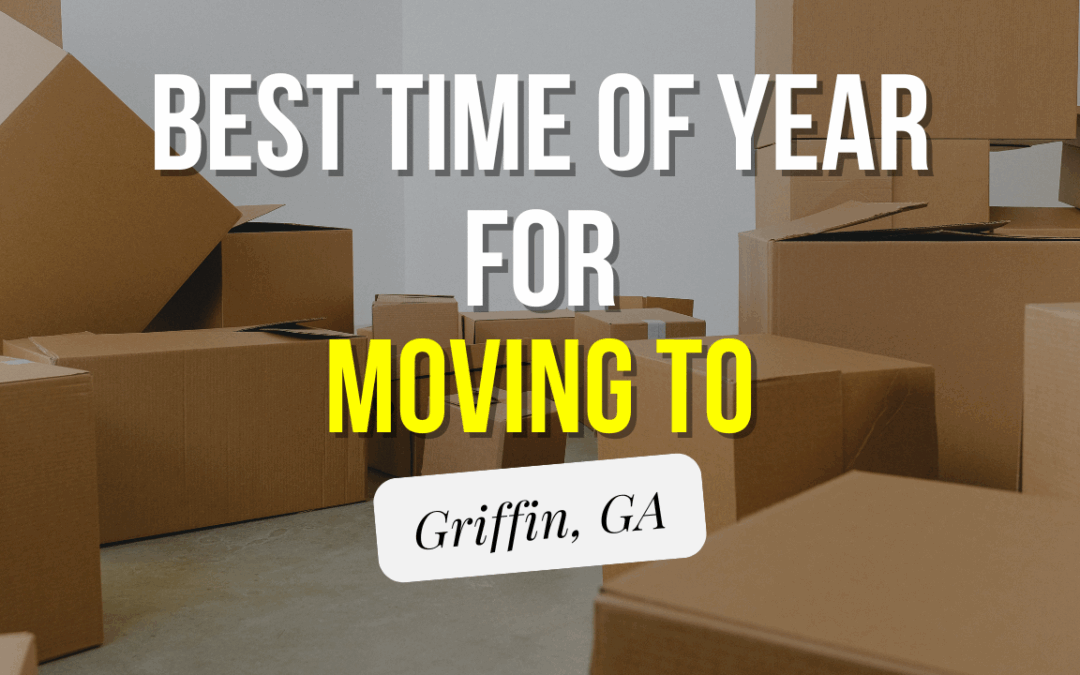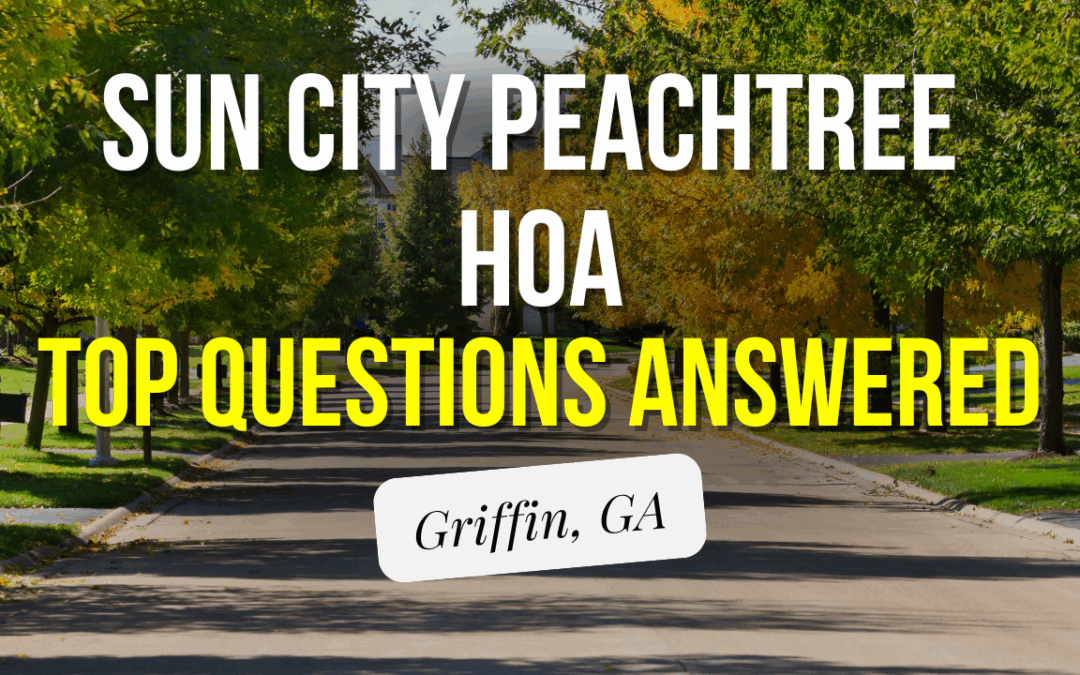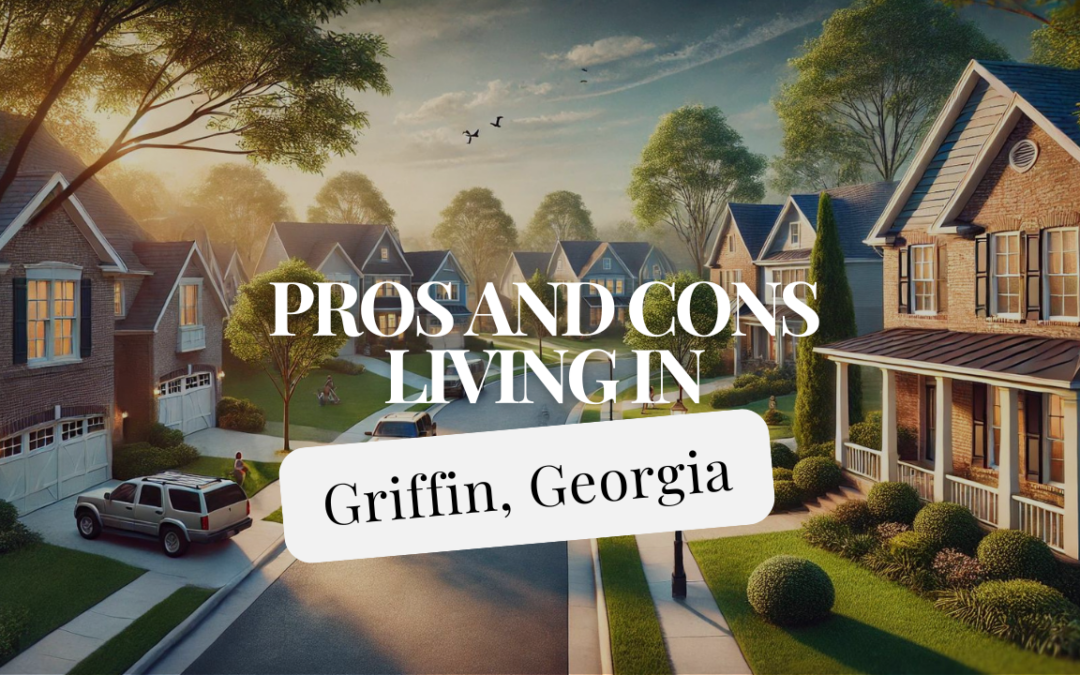Griffin, Georgia, offers a unique blend of small-town charm and proximity to urban amenities. Those considering a move to Griffin will find a relatively low cost of living, diverse housing options, and a peaceful lifestyle, but they should also be aware of the economic challenges and limited educational opportunities in the area. This city attracts both families and retirees, making it essential to weigh the benefits and drawbacks before making a decision.
Living in Griffin, Georgia, presents both advantages and challenges that potential residents should consider carefully.
Pros:
- Affordable Cost of Living: Griffin’s cost of living stands at 90, which is 10% lower than the national average.
- Diverse Community: The city is known for its ethnic diversity, creating a rich cultural atmosphere.
- Historic Charm: Griffin boasts a quaint downtown area with historic significance, appealing to those who appreciate Southern culture.
Cons:
- Limited Education Levels: Only 20% of adults hold a bachelor’s degree, which may impact job opportunities.
- Smaller Population: With around 22,725 residents, the community size is relatively small, potentially limiting social options and amenities.
- Economic Concerns: Median income is approximately $37,178, which is 45% lower than the national average, reflecting economic challenges faced by the community.
While Griffin boasts a welcoming community and a slower pace of life ideal for those seeking a quieter environment, its higher-than-average poverty rate can pose challenges for residents. The local economy provides some opportunities, yet job seekers may need to explore nearby cities for better prospects. Understanding the balance of pros and cons can help future residents assess whether Griffin is the right fit for their lifestyle and needs.
Navigating life in Griffin requires considering factors such as healthcare access and transportation options. For individuals who value affordability and community, Griffin can be a suitable choice, but potential challenges must be taken into account to ensure an informed decision about relocation.
Key Takeaways
- Griffin offers affordability and charm for families and retirees.
- Economic challenges exist, including a higher poverty rate than average.
- Community and lifestyle factors are crucial in deciding whether to move to Griffin.
Geographical Overview
Griffin, Georgia, is characterized by its distinct climate and strategic location within the Atlanta metropolitan area. Understanding these aspects provides valuable insights for those considering living in this city.
Climate
Griffin experiences a humid subtropical climate, characterized by hot summers and mild winters. Average summer temperatures often reach the lower 90s Fahrenheit, while winter temperatures can drop into the 30s.
Rainfall is fairly consistent throughout the year, with an annual average of about 50 inches. This precipitation supports the region’s lush vegetation and greenery, contributing to outdoor recreational opportunities.
Residents can expect occasional severe weather, including thunderstorms and tornadoes, particularly in spring. Understanding these climate patterns is crucial when planning for activities and home maintenance.
Location and Accessibility
Griffin is strategically located approximately 40 miles south of Atlanta, making it accessible for commuters. The city is situated at the intersection of U.S. Route 19 and State Route 16, facilitating easy travel to surrounding areas.
Accessibility to major highways provides residents with various options for transportation. Public transportation services are available, though they may be limited compared to larger urban areas.
Griffin’s proximity to Atlanta offers residents access to numerous amenities, including shopping, dining, and entertainment. Additionally, several parks and recreational areas are within easy reach, enhancing the living experience in Griffin.
Housing and Cost of Living
The housing market and cost of living in Griffin, Georgia, offer a range of options catering to different financial situations. Factors such as home prices and rental rates play a significant role in determining the affordability of living in Griffin.
Real Estate Market
Griffin’s real estate market features diverse housing options, making it appealing for various buyers. The median home price is approximately $116,100, which is significantly lower than the Georgia state average. This affordability is attractive for first-time homebuyers.
Rental options also vary, with a typical two-bedroom unit costing around $1,200 per month, which is 16.1% cheaper than the national average. The competitive prices contribute to Griffin’s appeal for families and individuals seeking more affordable living arrangements. Many homes are available in established neighborhoods with access to local amenities.
Living Expenses
Living expenses in Griffin are relatively low compared to national averages. The cost of living index is around 90, indicating that it is about 10% lower than the national average.
Average monthly expenses, including utilities and groceries, support a comfortable lifestyle. The median after-tax salary is approximately $4,203, sufficient to cover living costs for nearly two months. This financial landscape provides residents with an opportunity to enjoy a balanced lifestyle without excessive financial strain.
Education and Employment
Griffin, Georgia, offers a range of educational options and employment opportunities, reflective of its small-town character. Residents can assess the local school system’s performance and the job landscape’s stability for future prospects.
Schools and Education
Griffin is served by the Spalding County School System, which includes several public schools and a few private institutions. The district has a commitment to providing quality education, though the percentage of adults with a bachelor’s degree in Griffin is only 20%, lower than the national average. See the Best Schools in Griffin & Spalding County.
Key educational institutions include Griffin High School and the nearby schools focusing on various academic achievements. Community colleges and vocational schools also offer pathways for students to pursue higher education or skilled trades. Despite challenges, residents have access to educational resources that support both young learners and adult education initiatives.
Job Market and Economy
Employment opportunities in Griffin are somewhat limited due to its small population of around 22,725 residents. The city’s median household income is $37,178, which falls significantly below the national average, reflecting local economic challenges.
The job market is primarily supported by sectors such as manufacturing, retail, and healthcare. The presence of small businesses contributes to local employment, but the unemployment rate remains a concern. Many residents may seek job opportunities in nearby larger cities to enhance career prospects, leading to a blend of local and regional employment dynamics. The economic landscape may require strategic planning from job seekers to navigate these challenges effectively.
Lifestyle and Culture
Griffin, Georgia, offers a unique lifestyle shaped by its rich traditions and cultural amenities. Local events and community gatherings foster a sense of belonging, while various cultural attractions enhance daily living.
Local Events and Traditions
Griffin hosts several annual events that reflect its heritage and community spirit. One of the most significant is the Griffin Strawberry Festival, which celebrates the local agricultural tradition by featuring food vendors, arts, and crafts. It draws visitors from neighboring areas, showcasing the city’s vibrant community.
Additionally, the Annual Spalding County Fair attracts families with rides, games, and entertainment. These events provide a platform for local talent and foster connections among residents.
Seasonal celebrations, such as Christmas parades and Independence Day fireworks, also play a crucial role in community bonding. Such traditions promote engagement and bring a festive atmosphere to the city throughout the year.
Cultural Amenities
Cultural amenities in Griffin contribute to its appeal as a place to live. The Griffin Auditorium regularly hosts performances ranging from concerts to theatrical productions, enriching the local arts scene. This venue serves as a hub for creativity and entertainment.
Moreover, Griffin’s historic downtown area features charming shops and restaurants that reflect the area’s southern heritage. Local art galleries showcase the work of regional artists, providing a platform for creative expression.
For those who appreciate outdoor activities, nearby parks offer recreational opportunities. Places like Wyatt Park and City Park provide scenic landscapes for picnics, walking trails, and community gatherings, enhancing the city’s lifestyle.
Healthcare and Safety
In Griffin, Georgia, access to medical facilities and understanding local safety conditions are crucial considerations for residents. This section explores the healthcare options available and examines safety and crime rates in the area.
Medical Facilities
Griffin offers a range of medical facilities serving the needs of its residents. The primary healthcare provider is WellStar Spalding Regional Hospital, which provides emergency services, surgery, and specialized care. Additional clinics and urgent care centers are available for less critical needs.
Residents can also find specialty services including pediatrics, orthopedics, and behavioral health. While the city may not have the extensive facilities found in larger urban areas, the available healthcare options strive to meet essential medical needs effectively.
Safety and Crime Rates
When considering safety, Griffin’s crime rates pose important questions for potential residents. The city has faced challenges with crime, particularly property crimes, including burglary and theft.
According to recent statistics, the crime rate is higher than the national average, which can be a deterrent for those seeking a tranquil living environment. Local law enforcement is dedicated to community safety, implementing programs aimed at reducing crime and engaging with residents. Initiatives to foster neighborhood watch programs and safety workshops are common, helping to mitigate concerns about safety.
Transport and Infrastructure
Griffin, Georgia, offers a mix of public transportation options and infrastructure quality that residents should consider. Understanding these aspects can help individuals evaluate their commuting needs and overall convenience of living in the area.
Public Transportation
Griffin’s public transportation system is primarily serviced by the Griffin Transit system. This service includes fixed-route buses that connect key areas within the city.
Operating hours are generally from early morning to late afternoon, making it suitable for students and working professionals. Popular routes include connections to schools, shopping centers, and healthcare facilities.
Fares are affordable, typically ranging from $1 to $2 per ride. However, it’s important to note that coverage may be limited outside peak routes. Many residents rely on personal vehicles, as public transport options may not adequately serve all neighborhoods.
Infrastructure Quality
Infrastructure quality in Griffin varies between different areas of the city. Many neighborhoods boast well-maintained roads and essential services, contributing positively to the living experience.
Roads are generally in good condition, but some areas may experience the need for repairs or upgrades. The city has invested in infrastructure improvements, focusing on enhancing safety and accessibility.
Utilities such as water, electricity, and internet services are also considered reliable in Griffin. Both the public and private sectors work together to maintain these essential services, ensuring residents have access to what they need for daily living.
Pros of Living in Griffin
Griffin, Georgia, offers various advantages that contribute to its appeal as a place to live. The community focus and cost-effective living are noteworthy elements that enhance the quality of life for residents.
Community and Social Life
Griffin boasts a vibrant community life that fosters strong social connections. With a population of approximately 23,500, residents frequently engage in local events and gatherings. Key attractions include parks, community festivals, and farmers’ markets, which promote interaction among neighbors.
Various organizations and clubs cater to diverse interests, whether it’s arts, sports, or volunteering. This sense of belonging makes it easier for newcomers to integrate into the community. Areas like the historic downtown draw crowds and provide spaces for families to spend time together.
Moreover, local schools encourage parental involvement, further strengthening ties within the community. The collective interest in local development and welfare creates an inviting atmosphere that many find appealing.
Cost-Benefit Effect
Living in Griffin presents a compelling financial advantage. The cost of living is significantly lower than the national average, making it an attractive option for families and individuals alike. Housing expenses, utilities, and everyday goods typically cost less, allowing residents to allocate resources more efficiently.
The region offers affordable housing options, contributing to a favorable real estate market. Many residents find that their housing expenses are manageable, even on modest incomes. This financial relief extends to transportation and healthcare costs as well, providing an overall benefit to residents.
Furthermore, the lower cost of living does not compromise the quality of services available. Griffin has accessible amenities, including healthcare and recreational facilities, ensuring that residents enjoy a comfortable standard of living. This balance makes Griffin a financially sensible choice for many.
Cons of Living in Griffin
Living in Griffin, Georgia, presents several challenges that potential residents should take into account. These drawbacks can impact lifestyle, safety, and overall satisfaction with living in this small city.
Potential Disadvantages
One major concern is the crime rate in Griffin. The crime statistics indicate a higher prevalence of both violent and property crimes compared to the national average. Residents often express worries about safety, especially in certain neighborhoods. While initiatives may exist to improve community safety, anxiety over crime remains prominent.
Another disadvantage is the limited job opportunities within the region. The economy in small towns can be weaker, leading to fewer employment options. Many residents report that the scarcity of jobs increases competition and often results in lower wages compared to urban areas. This economic factor can make financial stability more challenging for families and individuals alike.
Challenges to Consider
Griffin’s small population contributes to its charm, but it also presents challenges. With around 22,725 residents, the community may feel isolated, lacking the amenities found in larger cities. Access to certain services, entertainment, and cultural activities can be limited.
Additionally, residents point out the need for improved public services and infrastructure. The quality of schools, healthcare facilities, and public transportation can vary. These inconsistencies can significantly affect daily life and children’s education, making it essential for families to research the available options before moving.
For individuals considering a move, understanding these factors can aid in making an informed decision about living in Griffin. The balance of affordability and socio-economic conditions plays a crucial role in shaping residential experiences in the city.
Frequently Asked Questions
This section addresses common inquiries about living in Griffin, Georgia, providing specific details on crime rates, living standards, housing options, employment, cultural attractions, and education.
What is the crime rate in Griffin, Georgia?
The crime rate in Griffin has been a concern for residents. According to recent data, the city experiences higher crime rates compared to national averages, particularly in property crime. Individuals interested in relocating should review the local crime report for comprehensive statistics.
How does Griffin, Georgia compare to nearby Atlanta in terms of living standards?
Griffin offers a lower cost of living compared to Atlanta. However, Atlanta boasts a higher range of amenities, job opportunities, and entertainment. Those weighing options between the two cities should consider the trade-offs in lifestyle and convenience.
What types of properties are available in the Griffin, Georgia housing market?
The housing market in Griffin features a variety of property types, including single-family homes, townhouses, and apartments. Prices tend to be more affordable than in larger cities, appealing to first-time buyers and those seeking budget-friendly options.
What are the main industries or employers in Griffin, Georgia?
Griffin’s economy is primarily supported by industries such as manufacturing, healthcare, and retail. Key employers in the area include local hospitals and various manufacturing plants, providing a diverse range of job opportunities.
What cultural or historical attractions are found in Griffin, Georgia?
Griffin is known for its historic downtown area, which features various cultural and historical attractions. Visitors can explore sites like the Griffin Museum and local theaters that highlight the city’s rich heritage and community events throughout the year.
What is the quality of education like in Griffin, Georgia?
Education in Griffin is served by local public schools and private institutions. The quality of education can vary, with some schools recognized for strong academic performance. Prospective residents may want to research school ratings and available educational programs.
Considering moving to Griffin, Georgia? Let’s Discuss your needs:

When Is the Best Time of Year to Move to Griffin, GA? A Seasonal Guide for Homebuyers and Renters
Griffin, Georgia offers a unique blend of small-town charm, growing real estate opportunities, and a climate that supports year-round outdoor living. But if you're planning a move, timing can make all the difference. The best time of year to move to Griffin, GA is...

Sun City Peachtree HOA: Answers to 15 Common Questions
Thinking about buying a home in Sun City Peachtree, the premier 55+ active adult community in Griffin, Georgia? Before you make the move, it’s important to understand the HOA (Homeowners Association) that governs the neighborhood. Below are 15 of the most common...

15 Must-Ask Questions Before Buying a Home in an HOA Community: What Every Buyer Needs to Know
Buying a home in a neighborhood governed by a Homeowners Association (HOA) can offer many perks, from well-maintained amenities to enhanced property values. But before signing on the dotted line, it’s crucial to ask the right questions. Doing so can prevent costly...

What to Expect During the Real Estate Closing Process in Griffin, GA
If you're buying or selling a home in Griffin, GA, the closing process is the final and most important step before keys or funds officially change hands. In Georgia, closings are typically handled by a licensed real estate attorney, and both buyers and sellers have...

Dekota Oechsle
With a decade of experience in commercial construction and a degree in construction management, I bring a unique perspective to my work as a REALTOR® and real estate investor. Specializing in residential, land, and investment properties, I am dedicated to helping my clients navigate the complexities of the real estate market.
What drives me is more than just transactions; it’s the relationships I build along the way. I believe in serving my clients with integrity and providing detailed, clear communication to ensure they feel confident every step of the way. My passion for real estate, combined with my extensive knowledge of construction, allows me to offer insights that are both practical and strategic.
I am committed to creating a positive experience for my clients, whether they are first-time homebuyers or seasoned investors. Together, we can turn your real estate goals into reality.
I’m here to assist you with your real estate needs; you can reach me at
770-268-0907 or send me an email at [email protected]

